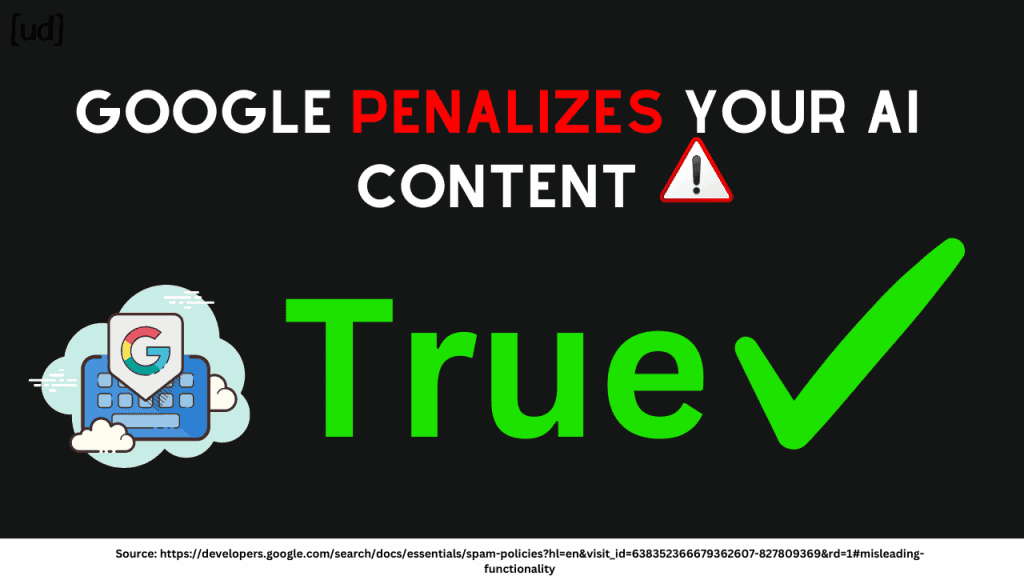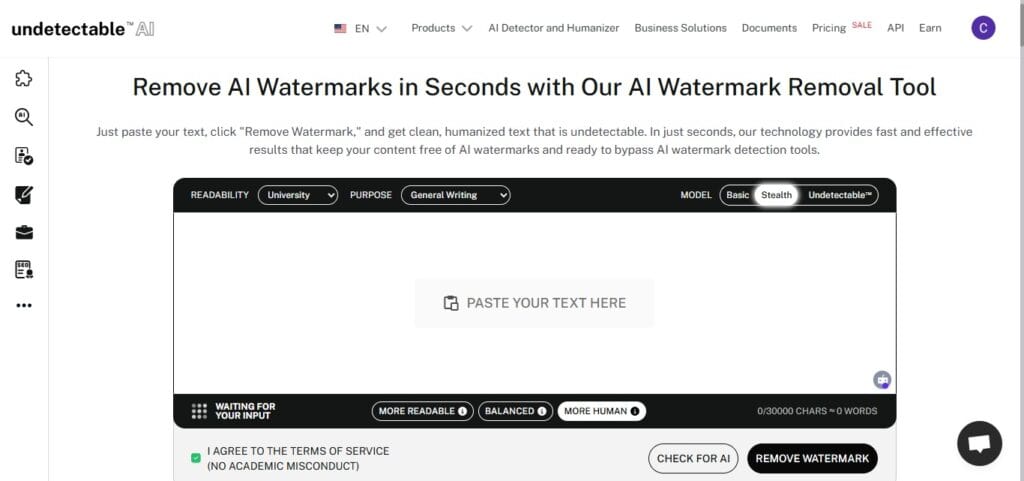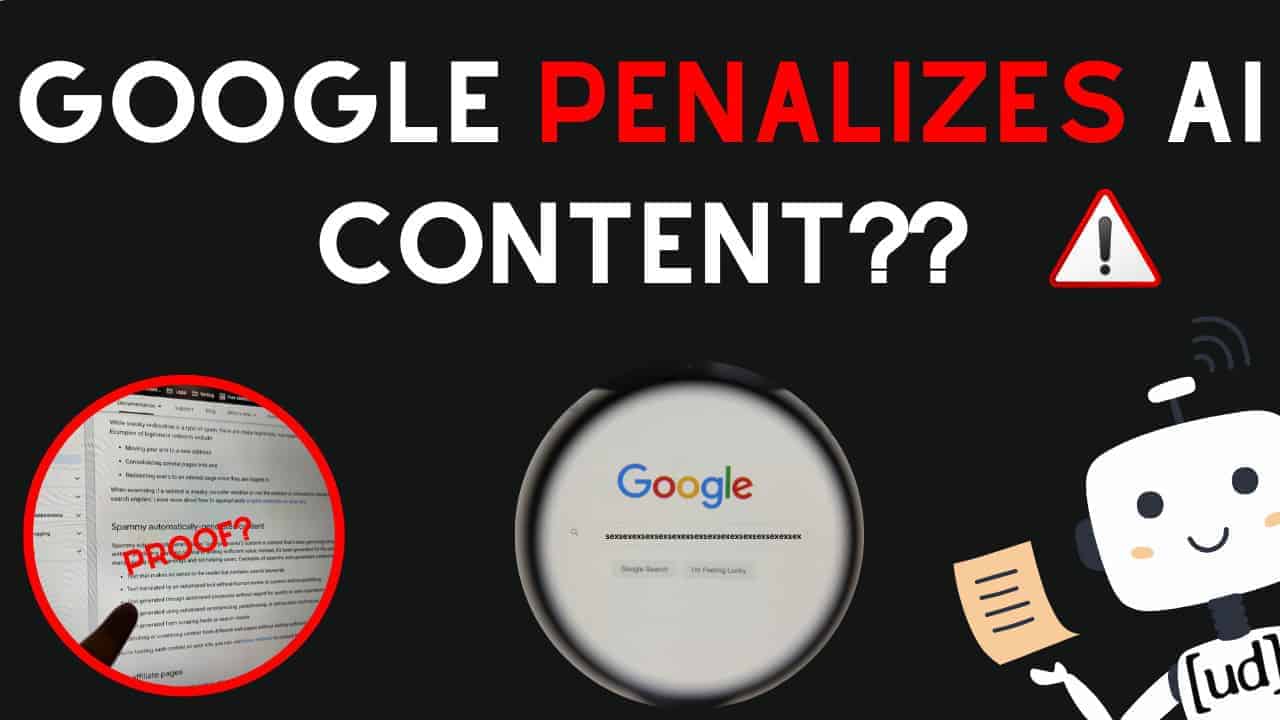Does Google penalize AI content or not? Some say yes, others say no? But what does google say?
Considering that 88% of marketers believe their organization must increase its use of automation and AI to meet customer expectations and stay competitive, knowing if Google punishes AI-generated content or not is important.
Key Takeaways
- Google uses special systems to find low-quality content made by AI.
- AI can help make more content, but it should not seem or feel auto-generated.
- If you want to avoid penalties from Google, always ensure that your AI-assisted content is written in a human-like way.
Google Penalizes AI Content: True Or False?

Google does penalize AI-generated content if it is deemed spammy or auto-generated, specifically when such content lacks originality, adds little value, and is crafted mainly to manipulate search rankings rather than to assist users.
This includes content with irrelevant keywords, poorly automated translations, low-quality AI generations or paraphrasing, and material sourced from scraping without adding significant value.
Basically, if your content looks like it was “Auto generated,” in the eyes of Google, they’ll penalize it. These insights come directly from Google’s spam policy documentation, which can be viewed here.


Never Worry About AI Detecting Your Texts Again. Undetectable AI Can Help You:
- Make your AI assisted writing appear human-like.
- Bypass all major AI detection tools with just one click.
- Use AI safely and confidently in school and work.
AI content penalties according to google
| Type of AI-Generated Content | Does Google Penalize? | Reasons for Penalization |
|---|---|---|
| Text with irrelevant keywords | Yes | Makes no sense to reader but contains search keywords |
| Machine-translated text without human review | Yes | Automated translation without human curation |
| Low-quality automated content | Yes | Generated without regard for quality or user experience |
| Content using synonymizing/paraphrasing techniques | Yes | Uses automated synonymizing, paraphrasing, or obfuscation |
| Content from scraping feeds/search results | Yes | Generated from scraping other sources without adding value |
| Stitched content from multiple sources | Yes | Combining content without adding sufficient value |
How To Avoid Getting Penalized For Using AI
While Google keeps a lot of their trade secrets under wraps. It’s only fair to assume that they’re using some form of AI detection in their algorithm to identify spammy content. But these systems may misidentify as well.
If you’re using AI to generate blog posts or website, copy one of the best ways that you can avoid getting flagged is to use an AI text humanize are like Undetectable AI
Unlike standard paraphrasers, Undetectable AI removes text watermarks, as well as AI vectors that detection algorithms look for, hence the difference between humanize or paraphraser, but we’ll talk about that more in a bit.
First lets break some things down.
Understanding AI-Generated Content
AI assisted content is significantly streamlining the process of creating online text.
Instead of human writers painstakingly crafting each sentence, software tools are now equipped to generate meaningful and coherent written material.
From conducting comprehensive research to formulating well-articulated pieces, AI writing tools are designed for efficiency and quality.
While this technology might sound intimidating or impersonal, you need to know that artificial intelligence doesn’t entirely replace the need for humans.
In fact these advanced tools complement our existing capabilities by alleviating routine tasks such as generating drafts or brainstorming ideas.
Afterward, SEO professionals and editors step in to ensure that all output meets Google’s guidelines and maintains an authentic human –– easing workload without compromising on standards.
Can Google Detect AI Content?
Google uses advanced algorithms to analyze web content, including those generated by Artificial Intelligence.
The search engine giant uses Natural Language Processing (NLP) techniques, a subset of AI itself, to decipher patterns in language use and determine the likely source of content generation.
It is this system that can potentially identify content produced through AI.
According to AI detector Originality.ai, there was a high correlation between content identified as AI content allegedly performing worse on google.
Although Google has sophisticated detection methods, it’s not an infallible system.
Technological advancements in the field of AI have led to some impressive developments. But if you’ve been wondering “Does Google penalize AI content?,” you now know the answe.
Paraphrased Vs Humanized Content
Today’s most powerful models–like Undetectable AI, can generate highly nuanced and human-like text that might skew the results of these detection tools.
While Paraphrasers like QuillBot have historically been used to spin content, Google has outlined that such practices is caused for flagging and penalization.
What makes an AI text humanizer different is that beyond paraphrasing incorporates human writing styles, which is unlikely to be detected, and therefore protect the content you put out.
Google’s Guidelines on AI Content
Auto generated content falls under Google’s spam policy guidelines referenced earlier; below is a screenshot from the direct Google document:
Impact of AI Content on SEO
Google has also set forth other explicit guidelines on AI content that can impact SEO
- Google’s quality rater guidelines base assessments on E-A-T (Expertise, Authoritativeness, Trustworthiness).
- High – quality content is prioritized over the method of creation, as per Google’s helpful content update.
- The search engine does not specifically penalize AI content but targets poor, low quality content.
- Automatically generated content is considered spammy and vulnerable to penalties.
- Content should satisfy the user’s search intent and be audience – focused.
- Duplicate or redundant content faces Google’s penalties regardless of whether it is human-written or AI-generated.
- Google removed a statement from its guidelines that required content to be “written by people,” indicating an acceptance of AI-generated material.
Exploring the influence of AI-generated content on website rankings, this section explains why quality triumphs over mere quantity.
It further illustrates with case studies highlighting how AI content manipulation affects search engine optimization performance.
The case for quality over quantity
Quality surpasses quantity when it comes to AI-generated content.
Google’s algorithms reward high-quality, relevant materials that demonstrate expertise and satisfy user search intent.
A well-crafted piece of content with in-depth knowledge, even if not as voluminous, can significantly outperform a larger amount of low-grade material in terms of SEO rankings.
Using AI tools can aid in creating such quality content while maintaining efficiency; however, the importance lies not just in using these tools but leveraging them skillfully to create outstanding work.
Case studies of AI content performance
To understand the real-world impact of AI-generated content, let’s delve into a few concrete examples.
| Company | Use of AI in Content Creation | Results |
|---|---|---|
| Associated Press | The news organization uses AI to generate financial and sports reports. | They increased content production by 12 times without sacrificing quality or accuracy. |
| Forbes | Forbes implemented AI to help find content ideas. | The AI tool improved the speed and efficiency of content creation by reducing research time. |
| Washington Post | The Post uses an AI technology called Heliograf to write news stories and social media posts. | This allowed them to cover a wider range of news and events, expanding their content offering. |
| Reuters | Reuters uses and offers AI assisted newsroom features. | The use of AI tools significantly increased content output, allowing the company to cover more stories. |
These case studies demonstrate that AI content can effectively increase content generation speed and volume while maintaining high-quality standards.
Does Google Penalize AI Content?
In this section, we delve into whether Google imposes penalties on AI-generated content, providing insights from various cases and examining the potential implications of these penalties.
Scenarios based on real life examples
These are some scenarios we have observed first hand:
| Case | AI Content Type | Google’s Response |
|---|---|---|
| Case 1 | Content created entirely by AI without any human intervention. | Google noticed, through its NLP algorithms, that the content lacks in-depth understanding and coherence, which resulted in lower ranking. |
| Case 2 | AI-generated content with editing or humanization. | Google did not penalize the website because the content was of high quality and specifically addressed search intent. |
| Case 3 | Excessive use of non humanized AI-generated content that lacks uniqueness and quality. | Google severely penalized the site, leading to a significant drop in the website’s ranking. |
| Case 4 | Use of AI for content inspiration and outlining. | Google favored this approach as it resulted in high-quality, audience-specific content that was created using the C.R.A.F.T editing framework. |
This illustrates that Google’s response to AI-generated content varies greatly.
The key factor determining Google’s reaction appears to be the quality and relevance of the content, rather than its origin.
It is therefore advisable to use AI writing tools while also ensuring the content remains high quality and tailored to the target audience.
Potential penalties and their implications
Penalties levied by Google on AI-generated content can severely affect the visibility and ranking of a website.
If your site hosts low-quality AI content that is stuffed with keywords, misleading, or doesn’t provide value to users, it may receive a penalty.
Such penalties could result in your webpage dropping in search engine results pages (SERPs), or worse, being entirely de-indexed.
The implications extend beyond just losing rank positions or online visibility.
A decrease in SERP rankings often leads to less organic traffic coming into the site, which can significantly impact sales and revenue for businesses relying heavily on their digital presence.
Additionally, regaining lost credibility and trust from a penalized website requires substantial efforts such as improving content quality and consistency while ensuring adherence to Google’s stringent guidelines for creating valuable user-focused content.
How to Use AI Content Without Getting Penalized
Explore strategic ways to use AI for content inspiration, outline your materials effectively and adapt them understandably for your audience, while always staying abreast with the ever-changing search engine guidelines.
Use an AI Text Humanizer
Our AI text humanizer elevates your writing to match the quality of human authored content. Clicking “humanize” eliminates any detection of AI.
Guarantees that your text will pass through AI detectors undetected.
You can try Undetectable AI easily with the widget below (English only). Enhance your content seamlessly and ensure it meets E-A-T principles while maintaining authenticity. Give it a try now!
To reduce false flags from automated systems, run draft copy through Undetectable AI’s AI Text Watermark Remover to clear hidden AI identifiers that can trigger spam signals.

It preserves meaning while smoothing phrasing so your content reads naturally and aligns with Google’s quality expectations.
AI for content inspiration
Leveraging AI for content inspiration is a smart and efficient strategy used by many successful digital marketers.
It helps in identifying trending topics, audience interests, and relevant keywords which can enhance the overall quality of the content.
AI tools like ChatGPT or Claude2 use natural language processing to create original pieces based on given prompts, inspiring writers with fresh perspectives.
They analyze data from various sources across the web to provide diverse insights into any given topic.
Interestingly, it’s not just text; AI can generate suggestions for video thumbnails and titles too! However, despite its prowess in automating processes, human involvement remains crucial to ensure the authenticity of AI-generated content.
Outlining your content
Creating a solid outline for your AI content is as essential as planning a road trip. It directs the writing process, guiding you from point A to B with clarity and purpose.
By strategically structuring your main concepts, sub-topics, and details in an organized format, it becomes easier to maintain focus while drafting the actual content.
An effective strategy includes identifying relevant keywords and incorporating them into each section rigorously adhering to Google’s quality standards for search intent.
Using AI-powered software like OpenAI or GPT-3 can help generate pertinent themes around which an impactful outline can be designed.
The goal is not just about having keyword-rich content but also ensuring that it caters to audience-focused content needs without compromising on expertise or user queries relevance.
Adapting content for audience
Creating personalized content is a key aspect of reaching and engaging your audience. AI-generated content can be tailored to suit the needs, interests, language style, location or demographic of your specific target audience.
This stratagem helps enhance user experience and interaction with the website. You can use customer data points from various sources like analytical tools, customer feedback, social media interactions etc., to adjust your AI-driven content strategy accordingly.
The right software in artificial intelligence optimization (AIO) works wonders for this purpose as it allows adaptive outputs according to specified instructions – aligning the output more closely with users’ search intent and satisfying Google’s quality standards for E-A-T (Expertise, Authority, Trust).
Staying up-to-date with search engine guidelines
Keeping pace with evolving search engine guidelines is crucial in leveraging AI-generated content effectively.
Google regularly releases updates to its algorithms and these can significantly affect the performance of websites on search results pages.
Webmasters must acknowledge these changes promptly and adapt their strategies accordingly, which may involve tweaking the AI technology used for generating content.
Understanding Google’s helpful content update matters as it highlights the importance of creating audience-specific, intent-satisfying content that also showcases expertise.
Essentially, mastering search engine rules sustains a harmony between technological advancement in artificial intelligence and the demands of SEO practices.
AI Content vs. Automatically Generated Content
AI Content and Automatically Generated Content are essentially the same thing, but they come with their own set of characteristics and functionalities.
- AI content relies on sophisticated algorithms like OpenAI’s GPT3. These algorithms have been trained on massive data sets to mimic human writing styles and generate original pieces of text.
- In comparison, some automatically generated content may use a programmatic approach. It typically involves less advanced scripting or programming codes that pull information from certain sources or databases to produce text.
- One key distinction lies in the nuances and complexity of language usage. AI systems like GPT-3 can understand context, sentiment, style, tone, and even humor which makes the output much more human-like.
- Automatic tools generally lack this depth as they mainly rearrange existing phrases or replace words using synonyms without understanding the broader context or meaning.
The Future of AI Content and Google’s Evolving Algorithms

Is your content future proof?
AI content creation is rapidly evolving as machine models like Undetectable AI become more advanced.
Combined with AI generative text, our tool is capable of producing high-quality, contextually relevant articles that can mimic human writing styles so convincingly that even Google and other search engines have difficulty distinguishing between them.
Meanwhile, Google isn’t sitting idle; its algorithms continue to evolve in an attempt to maintain the integrity of search results.
Future updates will likely focus more on understanding the nuanced human touch in content and how well it aligns with user intent rather than who or what wrote it.
Therefore, professionals must keep up-to-date not only with advancements in AI-generated technology but also with changes in search engine guidelines to ensure their content remains visible and viable.
Conclusion
So does google penalize AI content? Yes. Google focuses on content it deems non-autogenerated. It claims not to penalize AI-generated content; rather, it penalizes poorly crafted texts. But AI content has been shown to get penalized.
Therefore, utilizing the right tactics to refine and optimize AI Content can lead to a powerful SEO or content marketing strategy.
AI Content Penalties: FAQs
Does Google penalize AI-generated content
Google’s spam policy says anything deemed low-quality auto-generated content will get penalized. While AI content creation doesn’t automatically guarantee a penalty, it can put you at risk
What are the key factors that influence search engine optimization (SEO) for AI content?
The E-E-A-T parameters(Ethically produced, high-quality AI content), user behavior signals, voice search capabilities, and adherence to Google’s webmaster guidelines significantly determine its SEO ranking.
How can I avoid content penalties when using automatic writing tools like ChatGPT?
Avoiding plagiarism checkers and making sure AI outputs don’t contribute to spam rating can be achieved through proper review, edit, and optimization procedures in addition with using an AI detection remover like Undetectable AI.
Can conversational AI-content improve user interaction and engagement?
Absolutely! Conversational style of generated text especially in chatbots can increase user interactions; trust building elements such as personal stories also enhance overall sentiment feedback.
Is there a way to evade detection from Ai detectors while improving my site’s authority?
To evade detection use Undetectable AI. Use strategies like backlink building, technical SEO, and producing fact checked content for the best odds of increasing authority and ranking.
